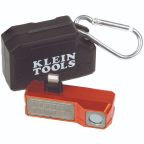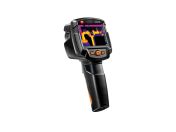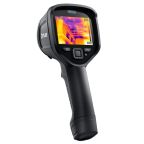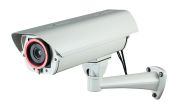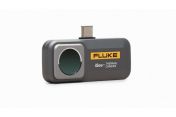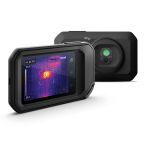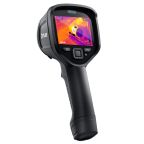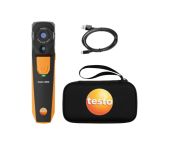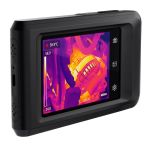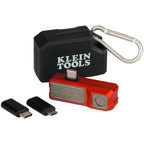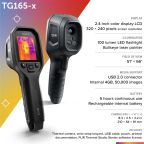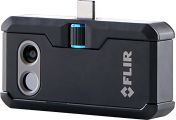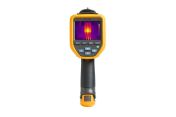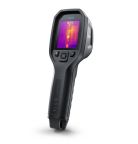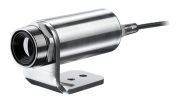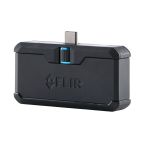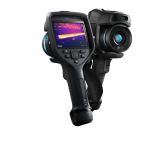Thermal Imaging Cameras
Thermal imaging cameras or heat detection cameras are handheld non-contact devices used to capture detailed images in low-light and hard to see environments. They do this by detecting infrared energy (heat) and converting it into an image. Thermal cameras are used for troubleshooting, identifying potential hotspots and ensuring machinery and equipment runs correctly and efficiently.
RS offer a range of high-performance, state-of-the-art thermal imaging cameras and measurement equipment from industry-leading brands including FLIR, Fluke, Testo, Hikvision, Keysight and of course RS PRO.
RS also offers a calibration service if required. See more about our calibration services.
Types of Thermal Cameras
RS NZ offers a comprehensive selection of thermal imaging cameras catering to a wide array of applications throughout New Zealand. Explore the diverse types of thermal cameras available, each uniquely suited to specific industries and use cases.
Handheld Thermal Imaging Cameras
Portable and ergonomic, handheld thermal imaging cameras are ideal for quick inspections and troubleshooting on the go. These versatile tools empower users to identify thermal anomalies and potential hazards across various sectors, including electrical maintenance, building inspections, and manufacturing processes.
Fixed-Mount Thermal Imaging Cameras
For continuous monitoring and surveillance, fixed-mount thermal imaging cameras provide an uninterrupted view of thermal activity. These cameras are commonly employed in security systems, industrial facilities, and critical infrastructure to detect and prevent potential issues before they escalate.
Automotive Thermal Imaging Cameras
Enhancing safety on the roads, automotive thermal imaging cameras provide drivers with heightened awareness, especially in low-visibility conditions. By detecting the heat signatures of pedestrians, animals, and objects, these cameras help prevent accidents and improve overall road safety.
Drone-Mounted Thermal Imaging Cameras
Offering a bird's-eye view, drone-mounted thermal imaging cameras revolutionise aerial inspections and surveys. These cameras capture high-resolution thermal imagery from above, providing valuable insights for agriculture, infrastructure assessment, search and rescue operations, and more.
Smartphone Thermal Imaging Cameras
Combining convenience with cutting-edge technology, smartphone thermal imaging cameras transform your mobile device into a powerful thermal imaging tool. These compact attachments enable users to perform quick thermal checks and analyses for a wide range of applications, from home inspections to DIY projects.
Medical Thermal Imaging Cameras
In the medical field, thermal imaging cameras offer a non-invasive way to assess physiological conditions and monitor health. These cameras detect subtle temperature variations on the skin's surface, aiding in the diagnosis and management of various medical conditions, such as circulatory disorders and inflammation.
How Does Thermal Imaging Work?
Thermal imaging cameras are point-and-shoot devices that enable the user to see real-time in an infrared spectrum, interpreting temperature as colour. Warmer areas appear as red and yellow, and cooler areas as purple or blue. Thermal imaging cameras use an external lens to focus infrared energy to an internal thermal sensor. The sensor, along with processing electronics convert the heat and use the captured data to create imagery. These images can be used for immediate diagnosis or can be stored and processed through dedicated software for further evaluation.
What Do Thermal Imaging Cameras Detect?
Any object with a temperature above zero will give off thermal energy. The hotter an object is, the more thermal energy will be emitted. So, essentially thermographic cameras can detect anything that produces a heat signature.
What Are Thermal Cameras Used For?
The possibilities are endless! Thermal imaging cameras were originally developed for military and surveillance operations, but now their useful technology enables the cameras to be used in a wide range of other applications. Some of the most common are:
- Electrical engineering: Used to identify hotspots in electrical enclosures. Engineers can detect potential equipment failures caused by equipment overheating.
- Fire Service: Firefighters use thermal imagers to see through smoke and localise fire hotspots.
- Automotive Industry: Mechanics use thermal imaging cameras for engine diagnostics
- Medical: Doctors, nurses and vets can use cameras to detect fevers in human’s temperature or temperature differences in animals.
- Construction: Building inspectors use cameras and thermal images for checking insulation and for detecting leaks in heating systems.
- Gas Detection: Visualising and pinpointing gas leaks for safety and maintenance purposes.
- Search and Rescue: Locating missing persons or animals in low-visibility conditions.
How to Order an Infrared Thermography Camera from RS?
Infrared thermography cameras, also known as thermal cameras, are essential tools in various industries for detecting heat signatures and identifying potential problems. RS New Zealand, a trusted supplier and distributor of high-quality test and measurement equipment, offers a wide range of thermal imaging cameras to meet your specific needs.
Our selection includes top brands such as Fluke, Testo, and FLIR, known for their accuracy, reliability, and advanced features. Whether you need a handheld thermal camera for on-site inspections or a fixed-mount solution for continuous monitoring, RS has the perfect thermal imaging camera for you.
Delivery Information for New Zealand
To have your purchases delivered the next working day, please place your orders for items stocked locally in New Zealand or Australia before 5 pm NZT and 3 pm NZT, respectively.
RS will deliver your thermal imaging camera orders between 8 am and 5 pm local time the next working day. However, a longer lead time may be required for some products, including:
- Global Stock and Extended Range products.
- Orders of hazardous materials.
- Products over 20kg, with a cubic weight exceeding 20kg, or longer than 1.5 metres.
Extended lead times may also apply to non-core products and deliveries to specific regional areas. For further details or to arrange consolidated delivery, please speak to our Customer Service.
Popular Searches
Related links
- Infrared Insights: How Thermal Imaging Cameras Work
- Fluke Thermal Imaging Camera Infrared Lens for Use with TiX1060 Thermal Camera
- Thermal Imaging Camera Accessories
- Fluke Thermal Imaging Camera Thermal Imager Visor
- Fluke Thermal Imaging Camera Thermal Imager Visor for Use with Ti200 Ti400
- FLIR Thermal Imaging Camera Infrared Lens for Use with E75 E95
- FLIR ONE EDGE Thermal Imaging Camera 80 x 60pixel Detector Resolution
- Fluke Thermal Imaging Camera Infrared Lens for Use with TiX875 and TiX870 Thermal Imager TiX885
